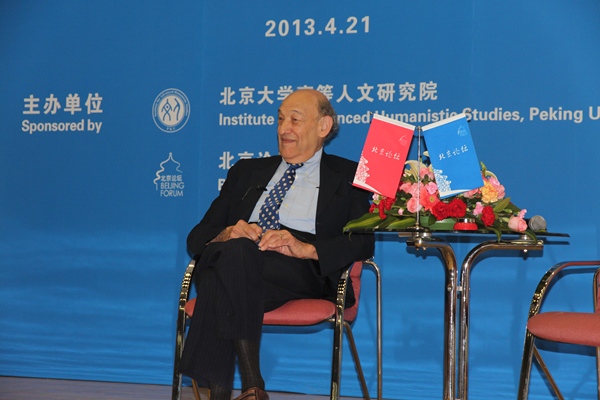Peking University, Apr. 22, 2013: “To resolve China-Japan tensions, it is to raise the level of communication, especially among young people, to learn from each other and exchange ideas. In this way could tensions be eased,” said China scholar Ezra F. Vogel (Fu Gaoyi) in Chinese.
Speaking on “Asia Vision in the 21st Century” to his audience at PKU (Beida) on April 21, Vogel, the emeritus professor and former director of Fairbank Center for East Asian Studies at Harvard University, emphasized the enhancing of understandings among members of the East Asian community.
"[Chinese leader] Hu Yaobang has supported communication among the youths and invited many Japanese young people to visit China in the 1980s," said Vogel. "The two countries have contradictory interests now, especially over the Diaoyu Dao dispute, but I don't think it necessary to have such tensions."
“Mutual understanding will change China-Japan relations profoundly,” Professor Vogel responded to a question on how to improve the bilateral relations that have reached an impasse.
"One of my Harvard teachers told me: 'How can you understand your own society if you don't have a better perspective from the outside?'" Professor Vogel added.
The lecture (Video/Beijing Forum)

Professor Ezra Vogel (Photo/Wu Cuiting)
Professor Vogel has been recognized as a prestigious sociologist and China expert due to his decades of devotion to East Asian studies, especially to the social, cultural, and political studies on China.
“It is always essential to conduct your survey within a broad social framework,” Professor Vogel noted about his research methods. Be aware of the grand perspective of social relations and the background of the target persons. The objects of sociological studies vary from small communities to the whole society, he added.
His research was not merely targeted at the academe. The major responsibility for intellectuals is to make academic results accessible to a broader audience, said Professor Vogel. "I would avoid using intellectual jargon but rather in a way to help explain to the ordinary people to increase their understanding.”
“East Asian nations grew rapidly during the phase of late development. They could learned from the industrial West and introduce technologies at a more rapid rate. In order for that, they had a more centralized governmental structure than Western countries, the late developers... having a central government that played a bigger role,” said Professor Vogel.
He also pointed out the key role Confucian traditions especially of education played among East Asian nations. The respect for hard work and strict disciplines was the other main factor that contributes to economic development in recent decades, according to the professor.
Based upon his in-depth study of East Asia, Vogel thought Japan had, and now China has, a lot of aspects "American people can learn from."
"A central direction that can move quickly for the good of the entire population can sometimes accomplish things much more quickly than places where individualism comes first and with many layers," Vogel added. "For example, in the construction of transport, Americans still have no high-speed rail transport. It is ridiculous, but I think it comes from the over-influences on the individualism."
When discussing about Guangdong and Hong Kong studies, he regarded the two regions as examples of the industrial structure of Asia, “after learning from the West, Guangdong and Hong Kong also exhibit specific aspects which contribute to the transformation of China.”
In Vogel’s mind, the American dream, Chinese dream, and East Asian dream share the same essence that consists of comfortable life and security in both personal and national senses. “The question is how we can devise a structure that will provide the realization of that dream for all Chinese and for all people in East Asia,” said Vogel.
“My efforts at Harvard, primarily as an educator, to my students and to the broader Western world... were to educate the American side to better understand Asia," said Vogel. "My mission was not only to teach students and inform the public, but to try to work more broadly with business and political leaders... and promoting their understanding.”
As demonstrating the relation between the local government and local community, Professor Vogel explained that people should take more responsibility “to help the government adjust its direction.” “There is enormous room for Chinese people to expand the level of freedom. The non-governmental organizations will play a greater, independent role in the future,” he predicted.
Tu Weiming, director of the PKU Institute for Advanced Humanistic Studies, praised the visiting professor as a “tolerant, vigorous, and professional scholar” with the sense of “servant leadership” during the introductory session of the event.
“Ezra has mentored a generation of young scholars in the domain of sociology, economics, and even journalism,” Tu spoke highly of Professor Vogel’s academic contribution. “His idea of an amicable and mutually beneficial relation among countries has a profound influence on modern international arena.”
"It's such a great pleasure to be at Beida," Professor Vogel said in his opening remarks. "I know when Weiming was thinking of retiring, he thought of the great university of China, Beida. He always thought Harvard has a special relationship with Beida."
Background Info:
This public lecture is part of the Beijing Forum Lecture Series, jointly sponsored by the PKU Institute for Advanced Humanistic Studies and Beijing Forum. Professor Vogel spoke at the first Beijing Forum in 2004.
The Chinese edition of his new book Deng Xiaoping and the Transformation of China was published on the Chinese mainland in January this year.
Reported by: Li Wenrui
Edited by: Jacques